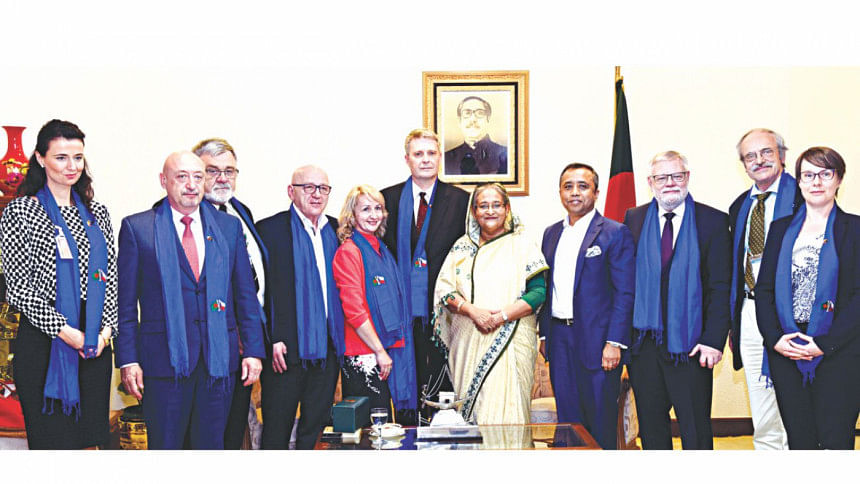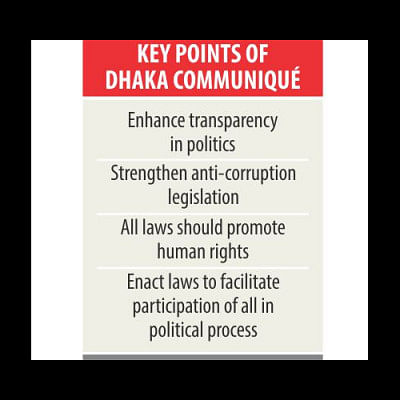Save politics from power of money

The Inter-Parliamentary Union has made a clarion call to parliaments across the globe to take measures to protect the political system from influence of money and organised lobbies.
In a communiqué issued at the end of a five-day conference in Dhaka yesterday, the IPU urged measures to enhance transparency and strengthen anti-corruption legislation.
It emphasised ensuring effective limits to private funding of candidates and political parties.
The IPU, a forum of parliaments around the globe, made the call amid ongoing discussions worldwide stressing the necessity of curbing influence of money in politics. Undue influence of money has long been blamed for manipulation of elections, corruption in politics and undermining of democracy.
Political analysts and many watchdogs have been saying that private funding of candidates and political parties is giving rise to corruption. And those who donate money to election funds for candidates and parties control them in many ways.
Talking to The Daily Star yesterday, Iftekharuzzaman, executive director of Transparency International Bangladesh, said, "This call for transparency in political and electoral finance is a timely resolution. If this is genuinely implemented, people in IPU countries can expect a long-cherished dream to be fulfilled, and their respective parliamentarians will deserve to be commended.

"Since IPU resolutions are non-binding, we would expect specific actions in IPU countries, including Bangladesh, to reform and reinforce legal, institutional and policy structures to truly and effectively translate this lofty commitment into practice," he said.
Expressing grave concern over the extreme political, social and economic inequalities prevalent in the world, the IPU called for immediate action to reverse this trend to promote democracy and human rights for all.
"It is clear to us that extreme inequalities come at a high cost to society, stalling economic growth, undermining the democratic process and social cohesion and increasing the risk of violence and insecurity," said the communiqué read out by Lyonpo Jigme Zangpo, speaker of the Bhutanese Parliament.
Parliamentarians who joined the conference from 132 countries pledged to “place concern for all inequalities” -- social, economic and political -- at the heart of their work.
IPU President Saber Hossain Chowdhury said, "We cannot continue to view the gap between rich and poor as business as usual. This assembly is one of many steps that need to be taken to ensure that well-being and dignity of all are respected."
In the opinion of IPU Secretary General Martin Chungong, the 136th IPU assembly in Dhaka was very significant, as several important resolutions were adopted in the conference with MPs from all over the world discussing many issues extensively.
“MPs have expressed their determination that parliaments will not give in to terrorist threat, a recent global phenomenon,” he said in his concluding remarks at a press conference.
Dhaka would be remembered in the days to come due to the significant outcome of the assembly, he mentioned.
The IPU secretary general hoped that after returning to their respective countries, the MPs would work in line with the Dhaka declaration for establishing human rights and combating inequalities in various sectors.
Apart from other issues, the communiqué focused on strengthening legal frameworks to promote human rights.
"Parliaments should ensure that all laws and budgetary allocations promote human rights for all and uphold the rule of law," it noted.
It also mentioned that parliaments should enact laws and regulations to facilitate the participation of all citizens, including the most vulnerable and marginalised in the political process, as well as their access to elected office.
In the conference, the parliamentarians underscored, among other things, the need for improving international cooperation to redress inequality.
Touching on the issue, the communiqué said, "Parliaments should consider advocating for a fairer representation of the interests of developing countries in the institutions of global economic and financial governance."
The IPU members adopted a resolution for guaranteeing women's access to financial mechanisms, said a news release of the IPU yesterday.
"Key to achieving gender equality is promotion and respect for the rights of girls. The Forum of Women Parliamentarians called for greater empowerment of girls, and legal measures to end gender-based violence," said the IPU.
About the significance of hosting the IPU conference in Dhaka, Speaker Shirin Sharmin Chaudhury said Bangladesh's image reached a new height, as MPs from all over the world witnessed firsthand the country's advancement in democracy and success in various sectors.
Founded in 1889, the IPU has been working for strengthening parliaments and democracy. Now, national parliaments of more than 170 countries are its members.
The five-day conference, jointly organised by the IPU and Bangladesh Jatiya Sangsad, began in Dhaka on April 1. More than 700 MPs from 132 countries attended it.


 For all latest news, follow The Daily Star's Google News channel.
For all latest news, follow The Daily Star's Google News channel. 







Comments